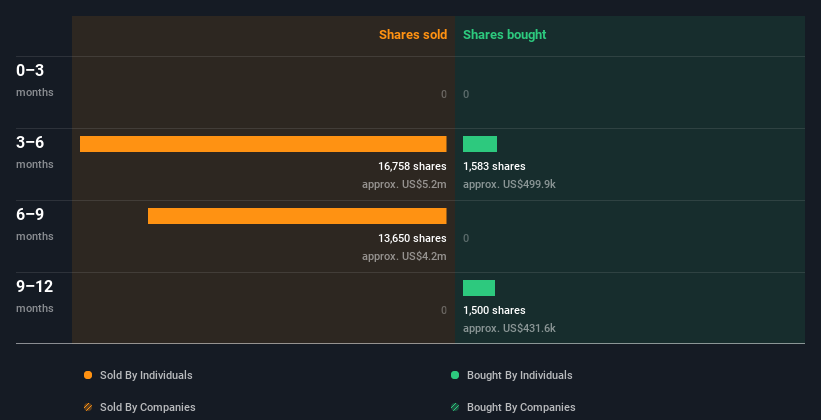The Home Depot, Inc. (NYSE:HD) insiders sold US$9.6m worth of stock, possibly signalling a downtrend
Over the past year, many The Home Depot, Inc. (NYSE:HD) insiders sold a significant stake in the company which may have piqued investors' interest. When evaluating insider transactions, knowing whether insiders are buying versus if they selling is usually more beneficial, as the latter can be open to many interpretations. However, if numerous insiders are selling, shareholders should investigate more.
While insider transactions are not the most important thing when it comes to long-term investing, logic dictates you should pay some attention to whether insiders are buying or selling shares.
View our latest analysis for Home Depot
Home Depot Insider Transactions Over The Last Year
Over the last year, we can see that the biggest insider sale was by the Executive Vice President of Customer Experience, Matthew Carey, for US$4.0m worth of shares, at about US$316 per share. That means that an insider was selling shares at around the current price of US$295. While insider selling is a negative, to us, it is more negative if the shares are sold at a lower price. In this case, the big sale took place at around the current price, so it's not too bad (but it's still not a positive).
In the last twelve months insiders purchased 3.08k shares for US$932k. On the other hand they divested 30.41k shares, for US$9.6m. All up, insiders sold more shares in Home Depot than they bought, over the last year. You can see a visual depiction of insider transactions (by companies and individuals) over the last 12 months, below. By clicking on the graph below, you can see the precise details of each insider transaction!
I will like Home Depot better if I see some big insider buys. While we wait, check out this free list of growing companies with considerable, recent, insider buying.
Does Home Depot Boast High Insider Ownership?
I like to look at how many shares insiders own in a company, to help inform my view of how aligned they are with insiders. A high insider ownership often makes company leadership more mindful of shareholder interests. Home Depot insiders own 0.07% of the company, currently worth about US$220m based on the recent share price. I like to see this level of insider ownership, because it increases the chances that management are thinking about the best interests of shareholders.
What Might The Insider Transactions At Home Depot Tell Us?
The fact that there have been no Home Depot insider transactions recently certainly doesn't bother us. It's great to see high levels of insider ownership, but looking back over the last year, we don't gain confidence from the Home Depot insiders selling. While we like knowing what's going on with the insider's ownership and transactions, we make sure to also consider what risks are facing a stock before making any investment decision. While conducting our analysis, we found that Home Depot has 1 warning sign and it would be unwise to ignore it.
Of course Home Depot may not be the best stock to buy. So you may wish to see this free collection of high quality companies.
For the purposes of this article, insiders are those individuals who report their transactions to the relevant regulatory body. We currently account for open market transactions and private dispositions, but not derivative transactions.
Have feedback on this article? Concerned about the content? Get in touch with us directly. Alternatively, email editorial-team (at) simplywallst.com.
This article by Simply Wall St is general in nature. We provide commentary based on historical data and analyst forecasts only using an unbiased methodology and our articles are not intended to be financial advice. It does not constitute a recommendation to buy or sell any stock, and does not take account of your objectives, or your financial situation. We aim to bring you long-term focused analysis driven by fundamental data. Note that our analysis may not factor in the latest price-sensitive company announcements or qualitative material. Simply Wall St has no position in any stocks mentioned.
Join A Paid User Research Session
You’ll receive a US$30 Amazon Gift card for 1 hour of your time while helping us build better investing tools for the individual investors like yourself. Sign up here

 Yahoo Finance
Yahoo Finance 
